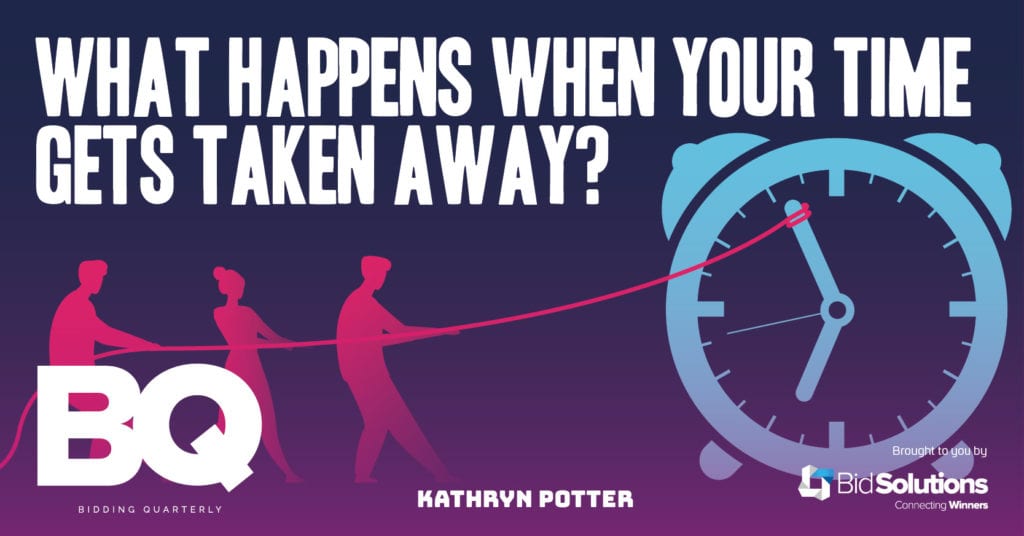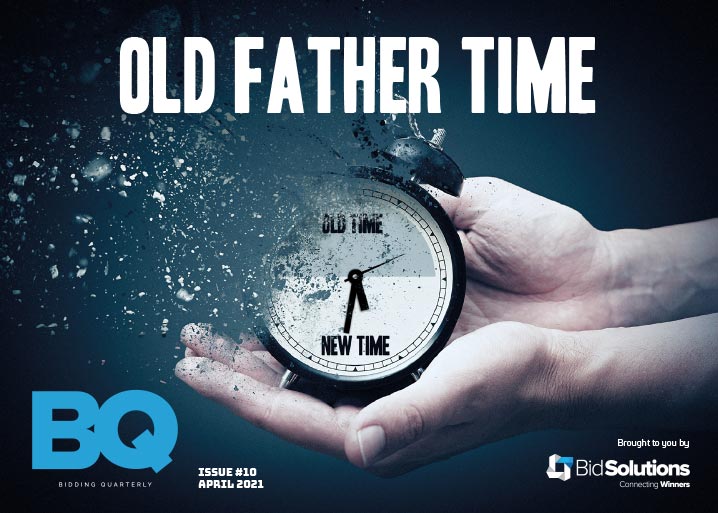
I’ve called this “What happens when your time gets taken away?” because we don’t think of this scenario very often, until something happens that makes you deal with it. We live sure of the fact that we can just shift something to another minute, hour or day. Often things run late (trains, work), we apologise for taking up additional time and sometimes give up hope of being on time (or early).
How many times in your working life have you had everything on time or ahead of the deadline? It’s the same in our personal lives, as we rush from here to there and don’t know what to do if we have five minutes extra.
The bid world thrives on deadlines and hopes for extensions to time. We generally don’t think about what would happen if we suddenly had the opposite of an extension. This applies to work and, by association, to one’s personal life.
In fact, what is the opposite of an extension even called? A reduction? A deduction?
The last year has been a peculiar one. Weeks melding seamlessly into one another. Time merging variously into a single, never-ending day. Many, many unending minutes that have felt like there is all the time in the world. The illusion of extra hours because commutes and travel have vanished entirely or changed significantly.
What happens if it felt like the never-ending day wasn’t attached to anything else? It’s easy to feel time has stood still and shifting things to the next minute is perfectly logical. There are many, many more minutes. No rush!
Then a reduction notice arrives. The notice that says “Hey, this is your three-month (insert relevant time-frame) warning”. The notice that makes you sit down and take stock, work out your priorities and make sure they’re realistic.
Reduction notices can come in many guises – a few examples are severe ill health or injury, an unexpected change in a relationship, a baby arriving ahead of time, someone close to you (or you) being diagnosed with a terminal illness. They are almost always unexpected and they have to be dealt with logically, not emotionally. This is not to say that emotion isn’t involved, simply that logic should prevail.
So how do you deal with a deduction, reduction, shortening? In short – prioritise, be realistic and don’t think you’re a super-human.
Start with the facts of the situation. Write them down and be realistic about the impact they may have on what you can and cannot achieve. For example:
- The physical symptoms
- The impact these have on what you can and cannot manage – both at work and at home
- The impact on family (do you need help with shopping, school run, childcare, self-care?)
- The impact on your mental health (you need to make space for emotion but don’t let it rule things)
- What you might need to reassess about the way you manage your day (work/life balance)
Next, make a list of your priorities taking the facts into account. It can be challenging to be honest and realistic about things here, about how much you can fit into the time you have.
It’s important to be clear about what must be done, what would be nice to get done and what is non-negotiable. Understand from the logical perspective that there may be moments when you have to stop because of something you can’t control – e.g., delay at the hospital, fatigue that wasn’t expected, emotional load. Bear this in mind and allow for some ‘dead time’.
Mental health has been a focus this past year and is even more important when something unexpected happens. Talk to people you trust and build a support network so that they can help you. People want to help; you simply have to ask (and then accept the offer of help and explain exactly what you need doing!).
What causes a reduction in time can vary in severity but that doesn’t change how to deal with it. Reductions aren’t the end of the world, even if they can feel that way. Sometimes they’re exactly the opportunity you needed to wake up and smell the coffee and appreciate the sunrise and just being alive.
This article was written by Kathryn Potter.
Kathryn’s experience in bid writing covers sectors as varied as IT outsourcing to financial services, security services to reprographics and construction and rail. She sees content as the cornerstone of proposal development and understands that no matter what, it needs to be relevant and up-to-date.

